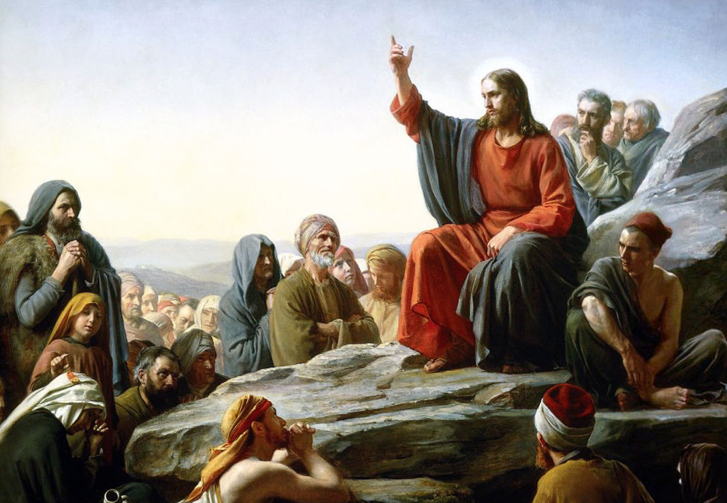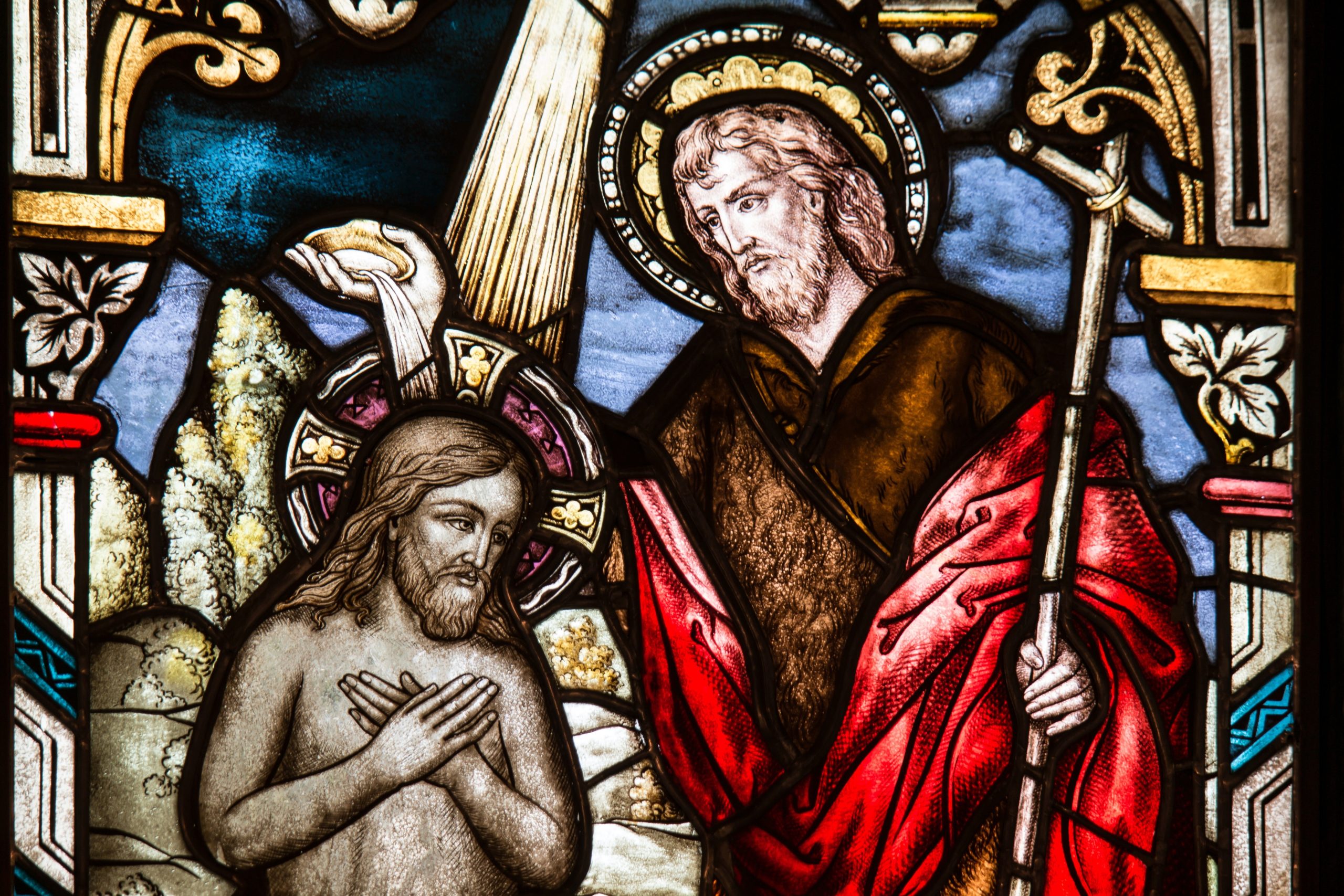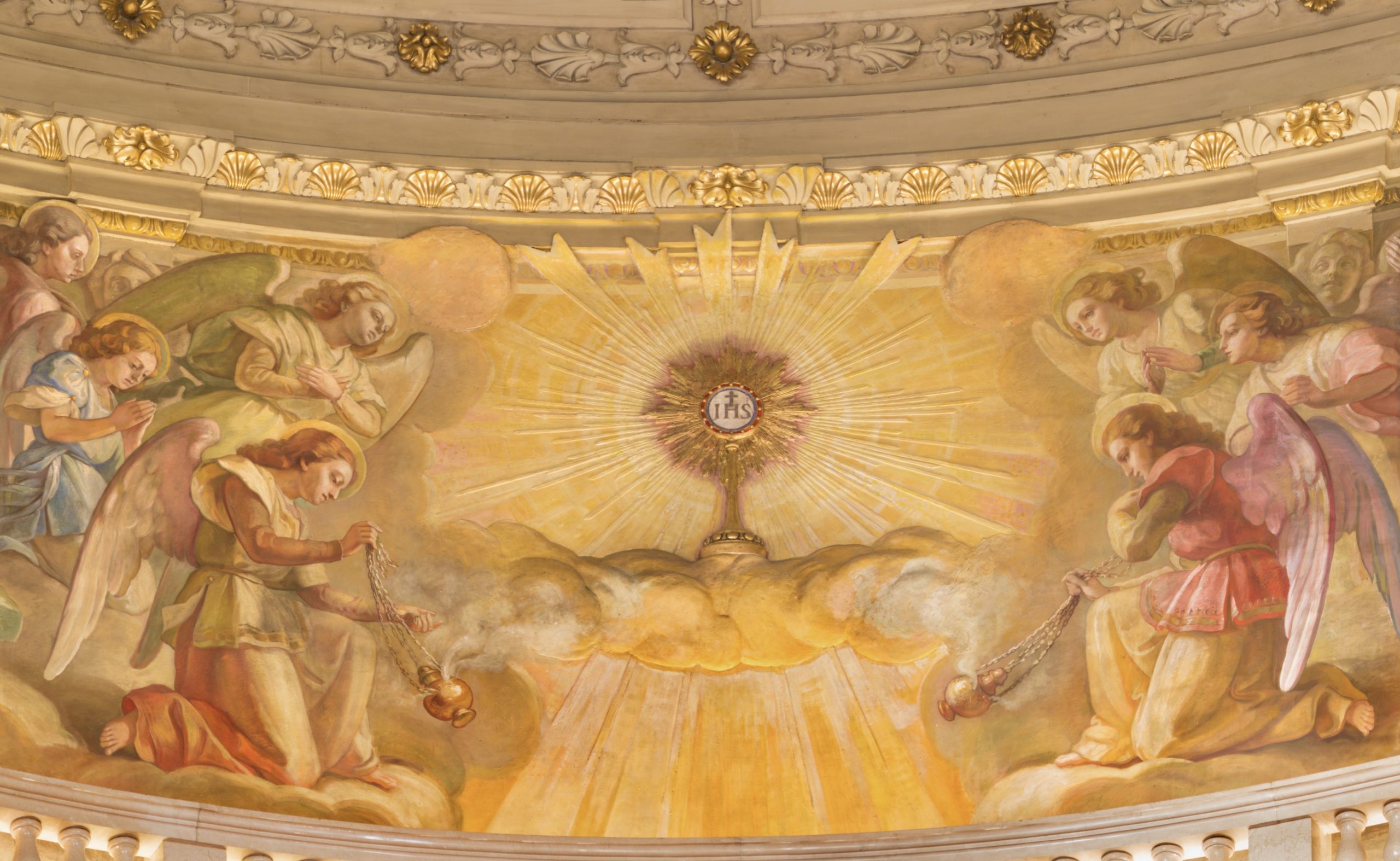From the Question Box: If Jesus is in the bread, why do we eat Him?
This question touches the heart of our faith and ponders the very nature of who God is and what His relationship with us is. The people of Jesus’ time asked this question as well. To begin to understand this mystery, which is the very center of our faith, we need to contemplate several theological truths.
First, consuming the Eucharist is not cannibalism. The Catechism of the Catholic Church tells us in paragraph 1367 that the sacrifice of Christ and the sacrifice of the Eucharist is one and the same, although the manner of offering is different. The Eucharist is a non-bloody sacrifice. The Eucharist makes present the sacrifice of the Cross and applies its fruit: everlasting redemption (CCC#1366).
Second, we consume the Eucharist because Jesus told us to do so. Jesus reveals the Eucharist to us in John 6: 51 – 58:
“I am the living bread which came down from heaven. If any one eats of this bread, he will live for ever; and the bread that I will give, is my flesh, for the life of the world. The Jews then disputed among themselves, saying: How can this man give us his flesh to eat? Then Jesus said to them: Amen, amen I say unto you: Unless you eat the flesh of the Son of man, and drink his blood, you have no life in you. He who eats my flesh, and drinks my blood, has eternal life: and I will raise him up in the last day. For my flesh is food indeed: and my blood is drink indeed. He that eats my flesh, and drinks my blood, abides in me, and I in him. As the living Father has sent me, and I live because of the Father; so he that eats me, will live because of me. This is the bread that came down from heaven. Not as your fathers ate and died; he who eats this bread, will live for ever.”
To comprehend what He is telling us, we need to look at God’s revelation to us in the Old Testament. We must realize that the entire Bible should be viewed as one book, one tapestry if you will. Just as colors are woven into a beautiful cloth and each color enhances the entire picture and contributes to the images, so too each book of the Bible contributes to our understanding of the truths God has revealed. One must look at the entire Bible to understand the context and meaning of each book. Just as removing one color from the tapestry removes depth, beauty, and meaning from the picture, so too we need every book in the Bible to understand what God is revealing to us.
Our first encounter of bread and wine being offered is in Genesis when Melchizedec, the King of Salem (Salem means peace and we refer to Jesus as “the Prince of Peace”), appears to Abraham and offers the sacrifice of bread and wine. Catholics link Jesus’ priesthood and that of our priests to Melchizedec: “You are a priest forever, according to the order of Melchizedec (Psalm 109:4 and Hebrews 5:6).” Melchizedec, whose name means “my king is righteous,” is a foreshadowing of Christ who will establish his priesthood and offer Himself as sacrifice and perpetually offer Himself to the Father as sacrifice in the form of bread and wine at every mass.
We again see the image of bread coming down from Heaven when The Lord feeds the Israelites in the desert: “Yahweh then said to Moses, ‘Look, I shall rain down bread for you from the heavens. Each day the people must go out and collect their ration for the day. (Exodus 16:4)”. The Israelites, wandering through the desert were completely dependent on God for their sustenance and God provided for all their needs. The Israelites were fed this ‘manna’ for forty years (Exodus 16:35). This bread coming down from Heaven nourishes the physical needs of the people so that they will not die; it is a foreshadowing of Christ coming down from Heaven in the form of the Eucharist to nourish our souls so we may have eternal life. The manna is described thus: “and next morning there was a layer of dew all round the camp.
In the Liturgy of the Eucharist the priest says, “Make holy, therefore, these gifts, we pray, by sending down your Spirit upon them like the dewfall, so that they may become for us the Body + and Blood of our Lord, Jesus Christ.” This prayer connects us to scripture and enlightens us in our understanding. Just as the manna came down from heaven to feed the Israelites, so too does Christ come down from Heaven to feed us.
John begins his gospel with the words: “In the beginning was the Word, and the Word was with God, and the Word was God….And the Word was made Flesh, and dwelt among us (Jn 1:1, 14). Jesus who is present in the Old Testament as The Word through whom all things were made, comes down from Heaven to us in history as fully human, “in the flesh” born of a woman. He continues to come down to us from Heaven daily in the form of the Eucharist. Jesus, knowing that we could not grasp this truth immediately, starts with baby steps. He gathers the people together and feeds them literal bread before revealing His intention to feed Himself to them as spiritual bread.
In the New Testament there are two stories of Jesus feeding crowds of people with only a few loaves. In Matthew 15, Jesus reached the shore of Galilee and went to a mountain where a crowd of people gathered and he healed many of them. Jesus was moved with compassion for them, for they had been following Him for three days and had nothing to eat. Jesus took all the food that the disciples had – seven loaves and a few fish – gave thanks and had his disciples distribute the food to 4,000 men not including women and children. When everyone had eaten his fill, the apostles collected the scraps and filled seven baskets. In Mark 6, he is preaching to a crowd who has followed Him from great distances to a deserted place. The apostles have 5 loaves and two fish. Jesus took the food, gave thanks, and had the apostles distribute the food. 5,000 men ate and there were twelve full baskets of bread after all had eaten. (Mark 8 repeats the story of the feeding of the 4,000 that is found in Matthew 15.)
The number of loaves – 7 and 12 — left over is significant. The number seven is a sacred number to the Hebrews because the word seven spelled out in Hebrew is the same word that is used for ‘covenant.’ The twelve loaves left over symbolizes the twelve tribes of Israel. The apostles understood that the God of Israel who fed their ancestors in the desert, was now feeding them. They were also reminded of the covenant that God made with Moses, who acted for the entire nation of Israel. God kept His end of the covenant, but Israel (like all human beings) continually broke it. Jesus is now making a new covenant between man and God, and it is Jesus who is fulfilling the covenant for us. Thus the covenant between God the Father and God the Son can never be broken. When the priest offers the bread and wine and gives thanks, he is repeating the thanksgiving that Jesus gave to His Father. The sacrifice of the Mass recalls the perfect and unbreakable covenant between Jesus and Our Father that was made for us.
Jesus gave us the gift of Himself in the Eucharist and offers it to us daily. When He taught us to pray the prayer we call the “Our Father,” He says “Give us this day our daily bread.” The early Greek-speaking Christians had a special word used for Eucharist which appears only in the Lord’s Prayer and nowhere else in Greek literature: “Give us this day our epiousion bread.”
The richness of the Eucharist is displayed in the earliest attempts to translate epiousion: “daily,” but also “supersubstantial” (the translation of St. Jerome for the Vulgate which became part of the Roman Canon), “perpetual,” and “necessary.” When epiousion is translated “future” or “coming” the eschatological thrust [our understanding of final matters, i.e., death] of the Our Father is emphasized: Give us today the bread for tomorrow, our sustenance for the next step in the journey. (Abbot Jerome Kendall, from ‘Our Father’, published in “Give Us This Day” January 2013 monthly edition).
The Eucharist is our daily bread which nourishes us now spiritually and its benefits extend into eternity. Our Lord is so in love with us that He wishes to give Himself to us every day.
When He tries to explain this mystery of the Eucharist to His disciples, many of them are scandalized and walk away. He does not stop them and say, “don’t go; this is only a parable.” No, He clearly states the truth again: “He that eats My flesh and drinks My blood abides in Me and I in him … This is the bread that came down from heaven. Not as your fathers ate manna, and are dead. He that eats this bread, shall live for ever. (Jn 6:56-59). He then turns to His 12 apostles and asks them if they wish to go too. We are moved by Peter’s response: “Lord, to whom shall we go? You have the words of everlasting life. We have believed and have known that you are the Christ, the Son of God.” (Jn 6: 69-70). We often, however, overlook the meaning of Jesus’s words “abides in Me and I in him.”
These words reveal to us exactly what the Eucharist is and what happens in our souls when we receive Him. The Eucharist is the Body, Blood, Soul, and Divinity of Jesus. Jesus is fully present in the Eucharist and in the Precious Blood. If we were only to partake of one of the forms of the Eucharist, we would receive the complete Eucharist because Christ is fully present in each form. When we receive Him, His Body merges with our bodies, His Blood flows through our veins, His Soul unites to our souls, His Divinity is shared with us. Because of Jesus, our souls will exist into eternity with Him. Our God is so crazy in love with us that He enters into every cell, every fiber of our being.
To put this into an easy to understand analogy, take a glass and fill it half full with water. This represents Jesus. Then add one more drop of water which represents you. You and Jesus become one. You can no longer reclaim and separate the drop that was originally added; it is now all one. This is what happens in Holy Communion. To extend the analogy, add drops of water for each person going to Communion. All are now part of the mystical Body of Christ.
This brings us to another theological truth to be realized: Jesus unites Himself with the entire Body of Christ, the Church, of which we are members. We refer to the Eucharist as Holy Communion. This expresses the truth that we are in communion with the pope, bishops, and Catholics throughout the world. We are in communion with the teachings of the Church. To be in communion means to be in agreement with the truth that Jesus revealed to His Church. We cannot pick and choose which teachings of the Church we choose to believe and follow and which we disregard. The truth cannot be divided into pieces we accept or reject. The truth is like the entire glass of water. Either we are part of the whole truth or we are not even in the glass of water. Every time we come forward to receive Holy Communion, we are affirming by this act that we are in communion with all the teachings of the Church which were given to us by the one who founded our church –Jesus Christ.
Our souls were created to be with God. We were created with the innate desire for God. Our souls long to be one with Him. To receive the Eucharist with love and an understanding of Who we receive fulfills our souls’ deepest longings and desires. There is nothing else on earth that we can experience or possess that will fulfill us completely. The Eucharist fulfills our souls’ desires for completeness, for wholeness, for oneness.
In order to deepen your love for the Eucharist, there are two beautiful prayers that will assist you. The first, The “Anima Christi” (which means Body of Christ) is said after receiving Communion and brings with it indulgences (time off from Purgatory). The second is the Angelus. It is normally said at 6am, noon, and 6pm. Because it is most frequently done with a group (either before or after mass is a common setting), there are the verse and response parts to it, but if saying it alone then say all the parts.
Anima Christi
Soul of Christ, sanctify me. Body of Christ, save me. Blood of Christ, inebriate me. Water from Christ’s side, wash me. Passion of Christ, strengthen me. O good Jesus, hear me. Within Thy wounds hide me. Suffer me not to be separated from Thee. From the malignant enemy defend me. In the hour of my death call me And bid me come to Thee. That with Thy saints I may praise Thee Forever and ever. Amen.
The Angelus
V. The Angel of the Lord declared unto Mary.
R. And she conceived of the Holy Spirit.
Hail Mary, full of grace, The Lord is with Thee; Blessed art thou among women, And blessed is the fruit of thy womb, Jesus. Holy Mary, Mother of God, Pray for us sinners, Now and at the hour of our death. Amen
V. Behold the handmaid of the Lord.
R. Be it done unto me according to thy word.
Hail Mary, etc.
V. And the Word was made Flesh.
R. And dwelt among us.
Hail Mary, etc.
V. Pray for us, O holy Mother of God.
R. That we may be made worthy of the promises of Christ.
V. LET US PRAY
R. Pour forth, we beseech Thee, O Lord, Thy grace into our hearts, that we to whom the Incarnation of Christ Thy Son was made known by the message of an angel, may by His Passion and Cross be brought to the glory of His Resurrection. Through the same Christ Our Lord. Amen.
References: The Holy Bible, Douay Rheims Version; Ewtn.com search engine for biblical references, Ewtn.com and our catholic prayers.com for the above mentioned prayers. Thanks to Lindsey West, Cheryl Amalu, and Father Bud Stevens for mentioning important things that inspired me in the writing of this article.





